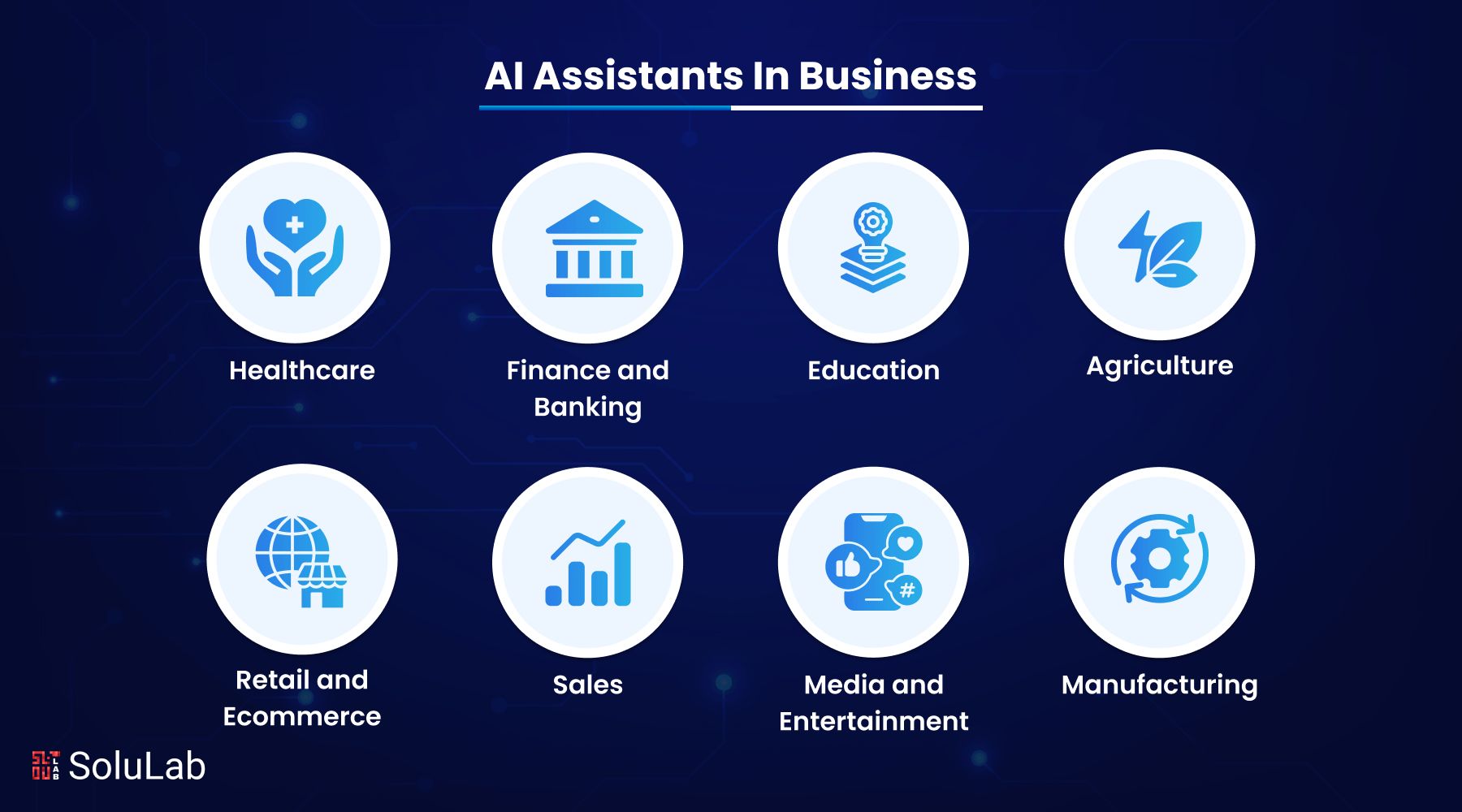
Struggling to keep up with endless emails, customer queries, and repetitive tasks? Many businesses today face the challenge of doing more with less—limited time, rising costs, and increasing competition. AI assistants for business are not just helping companies stay afloat—they’re helping them thrive. From media and finance to healthcare and retail, AI assistants are improving productivity, enhancing customer experience, and automating time-consuming processes.
A survey conducted by Teneo and the US Chamber of Commerce found that 40% of small businesses use generative tools like chatbots and image producers to speed up workflows and reduce expenses, while 98% of them currently use AI-enabled software.
And it’s not just about automation—advanced tools like an AI business coaching assistant are helping leaders make smarter decisions, track goals, and stay ahead of the curve. In this blog, let’s explore how businesses in every industry are getting real value with AI assistants—and why yours should too.
What Is The Role Of AI Assistants In Business?
Artificial intelligence (AI) assistants are essential for enhancing customer service, company processes, and productivity. By automating repetitive manual processes like email management, meeting scheduling, and reminder setting, AI in business helps employees save crucial time.
Chatbots and other AI business assistants offer real-time answers to frequently asked questions, function anytime, and cut down on wait times and overhead. AI personal assistants for business may track behavior, evaluate client data, provide tailored product recommendations, and increase conversion rates for sales and marketing teams.
Benefits of AI Assistants in Diverse Business Sectors

Business AI assistants are becoming game-changers in businesses, offering intelligent support across departments. Here are some key benefits they bring to modern workplaces:
1. Boost Productivity
AI assistants help teams save time by handling routine queries, scheduling meetings, and organizing information. This allows employees to focus on high-value tasks, increasing overall efficiency and workflow speed.
2. Task Automation
From data entry to follow-up emails, AI assistants automate repetitive tasks with accuracy. This not only reduces manual errors but also frees up employee time for creative and strategic thinking.
3. Improve Decision-Making
AI tools analyze large volumes of data quickly and provide real-time insights. Businesses can make smarter, data-driven decisions by spotting trends, predicting outcomes, and evaluating risks more effectively.
4. Customer Service
AI assistants can handle customer queries 24/7 through chatbots and voice support. They offer instant responses, reduce wait times, and ensure a consistent experience, enhancing customer satisfaction.
5. Reduce Costs
By automating processes and minimizing human error, AI assistants help cut down operational expenses. Companies can achieve more with fewer resources, especially in areas like support, analytics, and admin work.
6. Improves Security
AI systems monitor for unusual behavior and potential threats in real time. They help detect fraud, secure data access, and ensure compliance, strengthening a company’s overall cybersecurity posture.
Top AI Assistant Use Cases And Examples
Artificial intelligence (AI) assistants can be easily integrated into a variety of current systems, assisting your business in improving decision-making and flexibility across a range of tasks, positions, and departments while also increasing operational efficiency and productivity.
There are hundreds of uses for the best AI assistants for businesses, from sales and human resources to IT, engineering, and finance.
-
Finance and Banking
AI assistants simplify the work process, respond to customers, manage financial transactions, identify fraud, and support financial planning. They enhance efficiency, minimize human error, and provide custom banking experiences.
Real-World Example:
HDFC Bank has an AI chatbot, Eva, that responds promptly to customer queries and saves on wait time to increase user satisfaction.

-
Healthcare
The healthcare industry is changing as AI assistants enter into practice and help doctors provide better care to patients, and optimize the functioning of the hospital. There are AI assistants that can plan appointments, track a patient’s vitals, remind them about medication, and even assist in diagnosing patients based on their information. This saves time on working on the medical staff and responds to a patient faster.
Real-World Example:
Apollo Hospitals in India has also implemented the AI tools such as IBM Watson to help the doctors diagnose cancer faster by analyzing the reports of the patients and research material, and so doctors can plan treatments faster and more accurately.
-
Manufacturing
In the manufacturing industry, the use of an AI assistant can facilitate the control and management of inventory systems, health monitoring of the equipment used, and also manage the optimization of production processes. They contribute to improved supply chain coordination, lower downtimes, and on-time maintenance, resulting in improved efficiency and costs.
Real-World Example:
General Electric also employs AI-based assistants to forecast failures of equipment in its assembly lines. This type of predictive maintenance prevents frequent breakdowns of machines and enhances the overall productivity of the machine.
-
Education
The use of AI assistants is transforming the education process to provide personalized learning experiences, automate the work of administrators, and help instructors control a classroom better. They enable students to study independently and have immediate feedback, which makes learning easy and more efficient.
Real-World Example:
Languages can be learnt through platforms such as Duolingo, which incorporate the use of AI assistants to tailor research to the individual based on their progress and errors. This is to maintain the interest of the learners and also benefit them with speedy progress when the content is adaptive.
-
Agriculture
In agriculture, AI assistants help monitor crop health, manage irrigation schedules, and predict weather patterns. By analyzing large data sets from sensors and drones, they support farmers in making better decisions, improving yield, and reducing resource waste. This leads to more sustainable and profitable farming practices.
John Deere uses AI-powered assistants in its smart tractors to guide planting and harvesting. These systems collect real-time data on soil and crop conditions, helping farmers take timely actions and optimize productivity without constant manual checks.
-
Retail and Ecommerce
AI assistants are transforming how retail and ecommerce businesses interact with customers and manage operations. They help personalize shopping experiences by analyzing customer data, suggesting products, and automating customer service. AI also supports inventory management, order tracking, and handling returns, making the entire process faster and more efficient.
Real-world example:
H&M uses AI assistants to predict fashion trends, manage stock levels, and provide personalized recommendations to online shoppers, improving customer experience and boosting sales.
-
Media & Entertainment
AI assistants help content creators by automating video editing, managing social media posts, generating scripts, and analyzing viewer engagement. They save time, boost creativity, and help personalize content for different audiences.
Real-World Example:
Netflix uses AI assistants to analyze user behavior and recommend personalized content, helping retain viewers and increase watch time.
-
Sales
AI assistants are changing how sales teams work by saving time, increasing leads, and personalizing outreach efforts. They help automate lead generation, qualify prospects, send follow-up emails, and even suggest the best time to contact a customer, allowing salespeople to focus more on closing deals than chasing leads.
Real-World Example:
HubSpot’s AI-powered sales assistant automates follow-ups, analyzes email performance, and helps reps craft better pitches, resulting in higher engagement and improved conversion rates.
Future Trends in AI Assistants
Each day, AI assistants are getting smarter and more usable. Take a look at how these changes will help us have improved, safer, and human-like digital assistants in the future.
- Over-Personalization: AI helpers will be more personalized due to the different possible ways of analyzing your routines, tastes, and habits. They will provide personalized suggestions like reminding you to take some breaks at times when you are normally tired or having your favorite meal without you requesting it.
- Autonomous AI Agents: Future AI will not merely act on demands; it will act on its own. Such autonomous agents will save you time and energy because they can make appointment arrangements, answer emails, and do other simple tasks without constant supervision
- Governance of Pay Attention to Ethical AI: The increase in the strength of AI will require companies to work harder to create trust. To guarantee that AI will do the right thing and will not cause harm to people and spread misleading information, transparent rules and reasonable use will prevail.
- Increased Fraud Detection and Protection: Your data can be safely stored, and fraudulent schemes on the Internet can be detected more effectively with the assistance of AI helpers. To ensure that your personal information is safe, they will immediately inform you whenever they suspect some odd activity, like a fake email or unauthorized access.
- Multimodal and integrated AI systems: In the future, AI will be capable of understanding text, voice, images, and even video. That means that you are able to present a picture and ask questions about it, and you are able to take other input formats to be able to obtain more intelligent and insightful answers.
Conclusion
AI assistants are no longer a futuristic thing; they are needed in every industry. Everywhere, including media and finance, you can find businesses mining these tools to help automate functions, enhance customer service, and make wiser decisions. Whether these are business assistant AI in charge of schedules and organization, or an AI assistant for business owners real-time business insights to owners, the effect is evident.
AI-assisted development is also being facilitated by these clever tools that enable teams or individuals to innovate at a higher rate and operate with efficiency. Driven by the ever-evolving technology, AI assistants will only grow more powerful and customized in the future, and those are products that every business striving to be competitive and future-proof must have.
SoluLab, an AI development company in the USA, can help integrate AI in businesses across industries and help you grow your business. Contact us today to discuss further.
FAQs
1. How does an AI business assistant work?
An AI business assistant uses machine learning and natural language processing to understand commands, complete tasks, and provide intelligent suggestions in real time.
2. Is training required to use an AI business assistant?
Most AI business assistants are designed to be user-friendly, with simple interfaces and onboarding help. Minimal training is needed for most use cases.
3. How do AI assistants improve marketing?
They analyze user data, segment audiences, personalize campaigns, and schedule posts, making marketing efforts more targeted and efficient.
4. How secure is it to use an AI assistant?
Most AI assistants come with strong encryption and privacy features. However, businesses should ensure compliance with data protection laws and choose trusted providers.
5. What is an AI personal assistant for business?
An AI personal assistant for business is a digital helper that manages daily business tasks like scheduling, emailing, and reminders, saving time and improving workflow.






